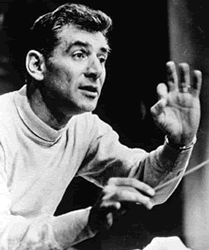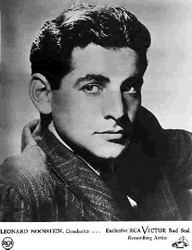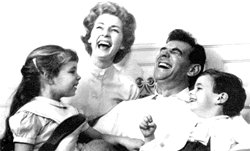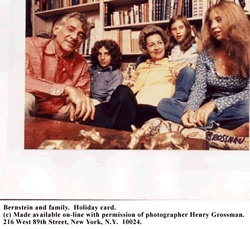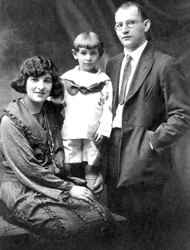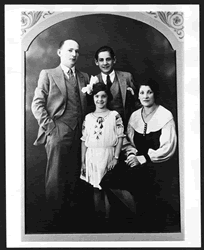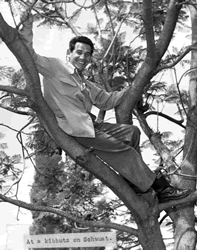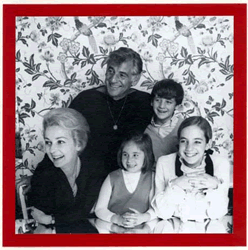#brstn-1
Leonard Bernstein
#brstn-2
Leonard Bernstein
#brstn-3
Leonard Bernstein with wife and children
#brstn-4
Leonard Bernstein with wife and children
#brstn-5
Leonard Bernstein with parents
#brstn-6:
Leonard Bernstein with parents and sister
#brstn-7
Leonard Bernstein in Israel
#brstn-8
Leonard Bernstein with wife and children
For more pictures;
http://en.wikipedia.org/wiki/Leonard_Bernstein
From Wikipedia, the free encyclopedia
Bernstein was born in Lawrence, Massachusetts in 1918 to a Jewish
family from Rovno, Ukraine. His grandmother insisted his first name be
Louis, but his parents always called him Leonard, as they liked the
name better. He had his name changed to Leonard officially when he was
sixteen. His father, Sam Bernstein, was a businessman, and initially
opposed Bernstein's interest in music. Despite this, the elder
Bernstein frequently took him to orchestra concerts. One time,
Bernstein heard a piano performance and was immediately captivated; he
subsequently began learning the piano at a young age. As a child,
Bernstein attended the Garrison and Boston Latin School. When his
father heard about the piano lessons he refused to pay for them, so
Bernstein taught young students himself and used that income to pay
for his own piano lessons.
Sam Bernstein was a Russian immigrant whose enthusiasm for America
understandably was fueled by a desire for success. He was a Talmudic
scholar destined to become a rabbi like his father. But upon his
arrival at age 16, he began life in America as a fish-cleaner in New
York's Lower East Side, working 12 hours, six days for a few dollars a
week. He changed "careers" by sweeping the floor for his Uncle Henry's
barbershop in Hartford, became a stockboy for a wig dealer,
tenaciously worked his way up and emerged as a relatively wealthy
distributor of beauty products.
The only musicians Sam had known had been klezmers – impoverished,
itinerant entertainers in his native Ukraine, who played at weddings,
bar mitzvahs and funerals in the hope of some spare change and an
occasional meal. Sam wanted far better for his first son. Despite
Leonard's fascination with the music he heard on the radio and in the
synagogue, Sam was determined that a musical career was out of the
question.
And so it was that until the age of ten, when most musical prodigies
already have dazzled the world with precocious talent, Leonard
Bernstein wiled away his time absorbing religious and pop tunes and
preparing to fulfill his father's goal of a practical career in
business. The messenger of change arrived in the form of a massive,
carved upright piano which his Aunt Clara stored at the Bernstein
house during her divorce. At first, Lenny played the piano
instinctively by imitating the music he had heard. Although he could
well afford it, Sam refused to pay for piano lessons. Exhibiting some
of his father's resolve and resourcefulness, Lenny raised money to pay
for his own lessons by teaching younger kids and recruited his
talented sister Shirley to share his enthusiasms.
http://www.leonardbernstein.com/lifeswork/biography/
As his son's talent began to emerge, Sam's attitude softened. He
bought Leonard a baby grand piano for his bar mitzvah. The next year,
Sam got some tickets to the Boston Pops through his temple and took
Leonard to his first concert. Leonard later recalled fantasizing with
the conductor, Arthur Fiedler, and became particularly mesmerized
during Ravel's haunting Bolero.
After graduation from Boston Latin School in 1935 Bernstein attended
Harvard University, where he studied music with Walter Piston and was
briefly associated with the Harvard Glee Club. After completing his
studies at Harvard he enrolled in the Curtis Institute of Music in
Philadelphia, where he received the only grade of "A" that Fritz
Reiner ever awarded in his class on conducting. During his time at
Curtis, Bernstein also studied piano with Isabella Vengerova and
Heinrich Gebhard.
During his younger years in New York City, Bernstein enjoyed a
promiscuous sexual life, mostly with young men (citation from Burton,
Leonard Bernstein). After a long internal struggle and a turbulent
on-and-off engagement, he married Felicia Montealegre Cohn on
September 9, 1951, reportedly in order to increase his chances of
obtaining the chief conducting position with the Boston Symphony
Orchestra. Dimitri Mitropoulos, music director of the New York
Philharmonic at the time and one of Bernstein's mentors, advised him
that marrying would help counter the gossip about his sexual life and
appease the conservative BSO board.
Leonard and Felicia had three children, Jamie, Alexander, and Nina.
During most of his married life, Bernstein tried to be as discreet as
possible with his extramarital liaisons. But as he grew older, and as
the Gay Liberation movement gained increasing momentum, Bernstein
became more emboldened, eventually leaving Felicia to live with
companion Tom Cothran. Felicia took up with actor Michael Wager. Some
time after, Bernstein learned that his wife was diagnosed with lung
cancer. His relationship with Cothran had deteriorated, so Bernstein
moved back in with his wife and cared for her until she died.
(citations from Burton, Leonard Bernstein). Some people, such as his
son, Alexander, believe that he essentially blamed himself for her
death, and disliked himself intensely after her passing. (citations
from Lacy documentary, Leonard Bernstein: Reaching for the Note). Some
claim to see a change in his conducting after Felicia's death as more
somber and heavy, more "wrung-out," with grossly elongated structures,
although others see this as just another example of many artists'
exaggerating of their original conducting style.
He was highly regarded as a conductor, composer, pianist, and
educator, and probably best known to the public as long-time music
director of the New York Philharmonic Orchestra, for conducting
concerts by many of the world's leading orchestras, and for writing
the music for West Side Story. All told, he wrote three symphonies,
two operas, five musicals, and numerous other pieces.
November 13, 1943, having recently been appointed assistant conductor
of the New York Philharmonic Orchestra, he made his conducting debut
when Bruno Walter was ill. He was an immediate success and became
instantly famous since the concert was nationally broadcast. The
soloist on that historic day was cellist Joseph Schuster, solo cellist
of the New York Philharmonic, who played Richard Strauss's Don
Quixote. Since Bernstein had never conducted the work before, Bruno
Walter coached him on it prior to the concert. After World War II
Bernstein's career on the international stage began to flourish. In
1949 he conducted the world première of the Turangalîla-Symphonie by
Olivier Messiaen. Bernstein was named Music Director of the New York
Philharmonic in 1958, a post he held until 1969. Beginning in the late
1950's, he became a well-known figure in the US through his series of
fifty-three televised Young People's Concerts for CBS, which grew out
of his Omnibus programs that CBS aired in the early 1950s. He became
as famous for his educational work in those concerts as for his
conducting. Some of his music lectures were released on records, with
several of these albums winning Grammy awards. To this day, the "Young
People's Concerts" series remains the longest running group of
classical music programs ever shown on commercial television. They ran
from 1958 to 1972. More than thirty years later, twenty-five of them
were rebroadcast on the now-defunct cable channel Trio, and released
on DVD. Unfortunately, the volumes in the set are not available
individually; therefore the concerts are unusually expensive.
In 1947 he conducted in Tel Aviv for the first time, beginning a
life-long association with Israel. In 1957, he conducted the inaugural
concert of the Mann Auditorium in Tel Aviv; he subsequently made many
recordings there. In 1967 he conducted a concert on Mt. Scopus to
commemorate the reunification of Jerusalem.
Beginning in 1970, Bernstein conducted the Vienna Philharmonic
Orchestra, with which he re-recorded many of the pieces that he had
previously taped with the New York Philharmonic, including sets of the
complete symphonies of Beethoven, Mahler, Brahms and Schumann. On PBS
in the 1980's , he was the conductor and commentator for a special
series on Beethoven's music, which featured the Vienna Philharmonic
playing all nine Beethoven symphonies, several of his overtures, and
the Missa Solemnis. Actor Maximilian Schell was also featured on the
program, reading from Beethoven's letters.
On Christmas Day, December 25, 1989, Bernstein conducted Beethoven's
Symphony No. 9 as part of a celebration of the fall of the Berlin
Wall. The concert was broadcast live in more than twenty countries to
an estimated audience of 100 million people. For the occasion,
Bernstein reworded Friedrich Schiller's text of the Ode to Joy,
substituting the word "freedom" (Freiheit) for "joy" (Freude). "I'm
sure that Beethoven would have given us his blessing", said Bernstein.
Bernstein was a highly-regarded conductor among many musicians, in
particular the members of the Vienna Philharmonic Orchestra and the
Israel Philharmonic Orchestra, of which he was a regular guest
conductor. He was considered especially accomplished with the works of
Gustav Mahler, Aaron Copland, Johannes Brahms, Dmitri Shostakovich,
George Gershwin (especially the Rhapsody in Blue and An American in
Paris), and of course with the performances of his own works.
(Unfortunately, Bernstein never conducted performances of Gershwin's
Piano Concerto in F, nor did he ever conduct Porgy and Bess.) He had a
gift for rehearsing an entire Mahler symphony by acting out every
phrase for the orchestra to convey the precise meaning, and of
emitting a vocal manifestation of the effect required, with a subtly
professional ear that missed nothing.
Leonard Bernstein died just five days after retiring. He conducted his
final performance at Tanglewood on August 19, 1990, with the Boston
Symphony playing Britten's "Four Sea Interludes" and Beethoven's
Seventh Symphony. [1] A longtime heavy smoker, he had battled
emphysema from his mid-20s; he suffered a coughing fit in the middle
of the Beethoven performance which almost caused the concert to break
down. On the day of his funeral procession through the streets of
Manhattan, construction workers removed their hats and waved and
yelled "Goodbye Lenny." Bernstein is buried in Green-Wood Cemetery,
Brooklyn, New York.
Name: Samuel Bernstein
Home in 1930: Boston, Suffolk, Massachusetts
Age: 37
Estimated Birth Year: abt 1893
Birth Place: Russia - came to the country in 1912
Relation to Head of House: Head
Spouses's Name: Jennie , age 34- married at age 20, born in
Russia.Came to the country in 1905.
Race: White
Occupation:merchant of beauty supplies
Education:
Military Service:Yes, World War 1
Rent Home Value: $90- owned a radio
Age at First Marriage: 37
Parents' Birthplace: Russia
Household Members: Name- Age
Samuel Bernstein 37
Jennie Bernstein 33
Leanord Bernstein age 11 born in Massachusetts
Shirley Bernstein age 6 born in Massachusetts
1920 census;
Name: Samuel Bernstein
Home in 1920: Revere Ward 2, Suffolk, Massachusetts
Age: 26 years
Estimated Birth Year: abt 1894
Birth Place: Russia
Relation to Head of House: Head
Spouses's Name: Jennie
Father's Birth Place: Russia
Mother's Birth Place: Russia
Marital status: Married
Race: White
Sex: Male
Home owned: Rent
Year of immigration: 1910 Na 1919
Able to read: Yes
Able to Write: Yes
Image: 201
Neighbors: View others on page
Household Members: Name Age
Samuel Bernstein 26
Jennie Bernstein 23 came to the country from Russia in 1900 Na 1919
Leonard Bernstein 1 6/12
https://www.youtube.com/watch?v=tzD4GV6kI84
Holocaust Survivor Ruth Birndorf Testimony
Interviewee Ruth Birndorf nee Bernstein
Gender F
DOB Aug 13/ 1931
Birth City Munich (Germany)
Birth Country Germany
Prewar Religious Identity traditional Judaism
Postwar Religious Identity reform Judaism
conservative Judaism
Hiding or False Identity Location Tilburg (Netherlands)
Type of Hiding Place attics
houses
Location of Liberation Tilburg (Netherlands)
Liberated By armed forces/ British
Other Experiences concealment of Jewish identity
Interview Location CA / U.S.A.
Interview Length 3:00:59
VHA Interview Code 32652
Experience Group Jewish Survivor
Description Forms part of the USC Shoah Foundation Institute Visual History Archive.
